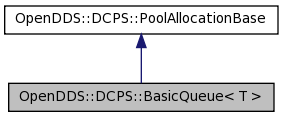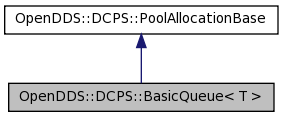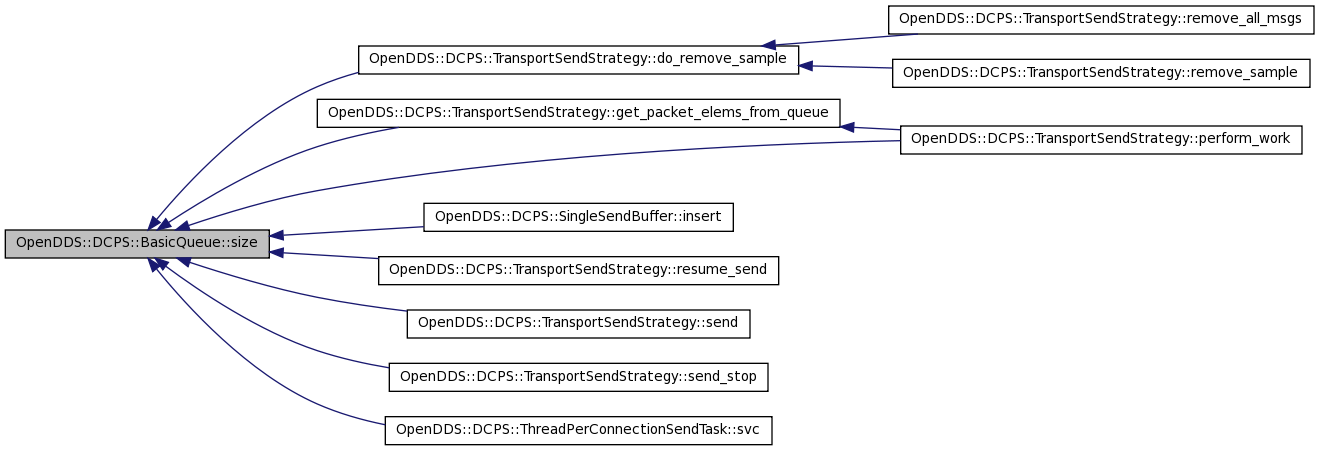#include <BasicQueue_T.h>


Public Member Functions | |
| int | put (T *elem) |
| Put a pointer to an element (T*) on to the queue. | |
| T * | peek () const |
| void | replace_head (T *value) |
| T * | get () |
| size_t | size () const |
| Accessor for the current number of elements in the queue. | |
| void | accept_visitor (VisitorType &visitor) const |
| void | accept_remove_visitor (VisitorType &visitor) |
| void | accept_replace_visitor (VisitorType &visitor) |
| void | swap (BasicQueue &other) |
Private Types | |
| typedef BasicQueueVisitor< T > | VisitorType |
| typedef QueueImpl::iterator | iterator |
| typedef QueueImpl::const_iterator | const_iterator |
Private Member Functions | |
| typedef | OPENDDS_DEQUE (T *) QueueImpl |
Private Attributes | |
| QueueImpl | elements_ |
Definition at line 24 of file BasicQueue_T.h.
typedef QueueImpl::const_iterator OpenDDS::DCPS::BasicQueue< T >::const_iterator [private] |
Definition at line 30 of file BasicQueue_T.h.
typedef QueueImpl::iterator OpenDDS::DCPS::BasicQueue< T >::iterator [private] |
Definition at line 29 of file BasicQueue_T.h.
typedef BasicQueueVisitor<T> OpenDDS::DCPS::BasicQueue< T >::VisitorType [private] |
Definition at line 27 of file BasicQueue_T.h.
| void OpenDDS::DCPS::BasicQueue< T >::accept_remove_visitor | ( | VisitorType & | visitor | ) | [inline] |
Alternate way to supply a visitor to the queue - this will invoke visit_element(T* element, int& remove) on the supplied visitor object once for each element in this BasicQueue<T> object, in order.
The remove argument is a flag that should be set to true (1) in the visitor's visit_element_remove(T* element, int& remove) method if the visitor decides that the element should be removed from the queue. The remove flag is always set to false (0) prior to calling the visitor's visit_element_remove(T* element, int& remove) method.
The visitor can stop visitation early by returning 0 from its visit_element_remove(T* element, int& remove) method.
Definition at line 93 of file BasicQueue_T.h.
Referenced by OpenDDS::DCPS::TransportSendStrategy::clear(), and OpenDDS::DCPS::TransportSendStrategy::do_remove_sample().
00093 { 00094 QueueImpl tmp; 00095 for (iterator itr = elements_.begin(); 00096 itr != elements_.end(); ++itr) { 00097 00098 int remove = 0; 00099 int keep_going = visitor.visit_element_remove(*itr, remove); 00100 if (!remove) 00101 tmp.push_back(*itr); 00102 if (keep_going == 0) { 00103 std::copy(++itr,elements_.end(), std::back_inserter(tmp)); 00104 break; 00105 } 00106 } 00107 elements_.swap(tmp); 00108 }

| void OpenDDS::DCPS::BasicQueue< T >::accept_replace_visitor | ( | VisitorType & | visitor | ) | [inline] |
This kind of visitation may cause the visitor to replace the currently visited element with a new element.
Definition at line 111 of file BasicQueue_T.h.
Referenced by OpenDDS::DCPS::TransportSendStrategy::do_remove_sample().
00111 { 00112 for (iterator itr = elements_.begin(); 00113 itr != elements_.end(); ++itr) { 00114 if (visitor.visit_element_ref(*itr) == 0) 00115 return; 00116 } 00117 }

| void OpenDDS::DCPS::BasicQueue< T >::accept_visitor | ( | VisitorType & | visitor | ) | const [inline] |
Standard way to supply a visitor to the queue - this will invoke visit_element(T* element) on the supplied visitor object once for each element in this BasicQueue<T> object, in order. The visitor can stop visitation early by returning 0 from its visit_element(T* element) method.
Definition at line 72 of file BasicQueue_T.h.
Referenced by OpenDDS::DCPS::SingleSendBuffer::insert_buffer(), OpenDDS::DCPS::TransportSendStrategy::prepare_packet(), and OpenDDS::DCPS::ThreadPerConnectionSendTask::remove_sample().
00072 { 00073 for (const_iterator itr = elements_.begin(); 00074 itr != elements_.end(); ++itr) { 00075 visitor.visit_element(*itr); 00076 } 00077 }

| T* OpenDDS::DCPS::BasicQueue< T >::get | ( | void | ) | [inline] |
Extract the top element from the queue. Returns 0 if there are no elements in the queue.
Definition at line 53 of file BasicQueue_T.h.
Referenced by OpenDDS::DCPS::TransportSendStrategy::adjust_packet_after_send(), OpenDDS::DCPS::TransportSendStrategy::get_packet_elems_from_queue(), and OpenDDS::DCPS::ThreadPerConnectionSendTask::svc().
00053 { 00054 T* result = 0; 00055 if (elements_.size()) { 00056 result = elements_.front(); 00057 elements_.pop_front(); 00058 } 00059 return result; 00060 }

| typedef OpenDDS::DCPS::BasicQueue< T >::OPENDDS_DEQUE | ( | T * | ) | [private] |
| T* OpenDDS::DCPS::BasicQueue< T >::peek | ( | void | ) | const [inline] |
Peek at the element at the top of the queue. This is just like the get() operation except that the queue remains intact.
Definition at line 41 of file BasicQueue_T.h.
Referenced by OpenDDS::DCPS::TransportSendStrategy::adjust_packet_after_send(), OpenDDS::DCPS::TransportSendStrategy::current_packet_first_element(), OpenDDS::DCPS::TransportSendStrategy::get_packet_elems_from_queue(), OpenDDS::DCPS::SingleSendBuffer::insert(), and OpenDDS::DCPS::RtpsUdpDataLink::MultiSendBuffer::insert().

| int OpenDDS::DCPS::BasicQueue< T >::put | ( | T * | elem | ) | [inline] |
Put a pointer to an element (T*) on to the queue.
Definition at line 34 of file BasicQueue_T.h.
Referenced by OpenDDS::DCPS::ThreadPerConnectionSendTask::add_request(), OpenDDS::DCPS::TransportSendStrategy::get_packet_elems_from_queue(), OpenDDS::DCPS::TransportSendStrategy::send(), and OpenDDS::DCPS::CopyChainVisitor::visit_element().
00034 { 00035 elements_.push_back(elem); 00036 return 0; 00037 }

| void OpenDDS::DCPS::BasicQueue< T >::replace_head | ( | T * | value | ) | [inline] |
Definition at line 45 of file BasicQueue_T.h.
Referenced by OpenDDS::DCPS::TransportSendStrategy::get_packet_elems_from_queue().

| size_t OpenDDS::DCPS::BasicQueue< T >::size | ( | void | ) | const [inline] |
Accessor for the current number of elements in the queue.
Definition at line 63 of file BasicQueue_T.h.
Referenced by OpenDDS::DCPS::TransportSendStrategy::do_remove_sample(), OpenDDS::DCPS::TransportSendStrategy::get_packet_elems_from_queue(), OpenDDS::DCPS::SingleSendBuffer::insert(), OpenDDS::DCPS::TransportSendStrategy::perform_work(), OpenDDS::DCPS::TransportSendStrategy::resume_send(), OpenDDS::DCPS::TransportSendStrategy::send(), OpenDDS::DCPS::TransportSendStrategy::send_stop(), and OpenDDS::DCPS::ThreadPerConnectionSendTask::svc().
00063 { 00064 return elements_.size(); 00065 }

| void OpenDDS::DCPS::BasicQueue< T >::swap | ( | BasicQueue< T > & | other | ) | [inline] |
Definition at line 120 of file BasicQueue_T.h.
Referenced by OpenDDS::DCPS::TransportSendStrategy::clear().
00121 { 00122 elements_.swap(other.elements_); 00123 }

QueueImpl OpenDDS::DCPS::BasicQueue< T >::elements_ [private] |
Definition at line 31 of file BasicQueue_T.h.
Referenced by OpenDDS::DCPS::BasicQueue< TransportQueueElement >::accept_remove_visitor(), OpenDDS::DCPS::BasicQueue< TransportQueueElement >::accept_replace_visitor(), OpenDDS::DCPS::BasicQueue< TransportQueueElement >::accept_visitor(), OpenDDS::DCPS::BasicQueue< TransportQueueElement >::get(), OpenDDS::DCPS::BasicQueue< TransportQueueElement >::peek(), OpenDDS::DCPS::BasicQueue< TransportQueueElement >::replace_head(), OpenDDS::DCPS::BasicQueue< TransportQueueElement >::size(), and OpenDDS::DCPS::BasicQueue< TransportQueueElement >::swap().
 1.6.1
1.6.1